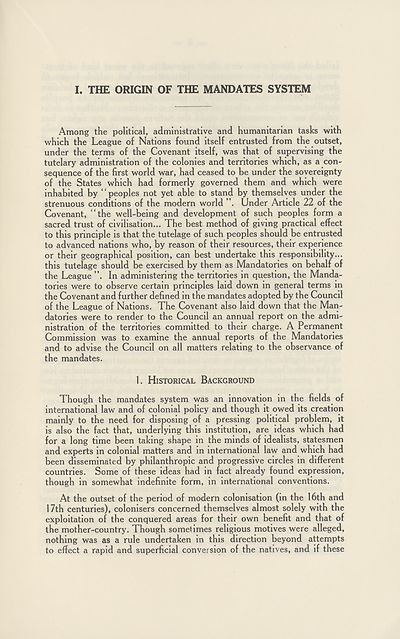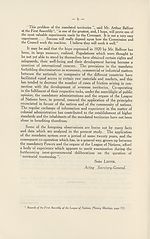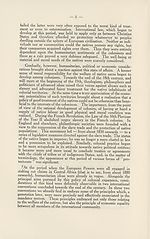Download files
Complete book:
Individual page:
Thumbnail gallery: Grid view | List view

I. THE ORIGIN OF THE MANDATES SYSTEM
Among the political, administrative and humanitarian tasks with
which the League of Nations found itself entrusted from the outset,
under the terms of the Covenant itself, was that of supervising the
tutelary administration of the colonies and territories which, as a con¬
sequence of the first world war, had ceased to be under the sovereignty
of the States which had formerly governed them and which were
inhabited by ‘ ‘ peoples not yet able to stand by themselves under the
strenuous conditions of the modern world . Under Article 22 of the
Covenant, “the well-being and development of such peoples form a
sacred trust of civilisation... The best method of giving practical effect
to this principle is that the tutelage of such peoples should be entrusted
to advanced nations who, by reason of their resources, their experience
or their geographical position, can best undertake this responsibility...
this tutelage should be exercised by them as Mandatories on behalf of
the League ”. In administering the territories in question, the Manda¬
tories were to observe certain principles laid down in general terms in
the Covenant and further defined in the mandates adopted by the Council
of the League of Nations. The Covenant also laid down that the Man¬
datories were to render to the Council an annual report on the admi¬
nistration of the territories committed to their charge. A Permanent
Commission was to examine the annual reports of the Mandatories
and to advise the Council on all matters relating to the observance of
the mandates.
1. Historical Background
Though the mandates system was an innovation in the fields of
international law and of colonial policy and though it owed its creation
mainly to the need for disposing of a pressing political problem, it
is also the fact that, underlying this institution, are ideas which had
for a long time been taking shape in the minds of idealists, statesmen
and experts in colonial matters and in international law and which had
been disseminated by philanthropic and progressive circles in different
countries. Some of these ideas had in fact already found expression,
though in somewhat indefinite form, in international conventions.
At the outset of the period of modern colonisation (in the 16th and
17th centuries), colonisers concerned themselves almost solely with the
exploitation of the conquered areas for their own benefit and that of
the mother-country. Though sometimes religious motives were alleged,
nothing was as a rule undertaken in this direction beyond attempts
to effect a rapid and superficial conversion of the natives, and if these
Among the political, administrative and humanitarian tasks with
which the League of Nations found itself entrusted from the outset,
under the terms of the Covenant itself, was that of supervising the
tutelary administration of the colonies and territories which, as a con¬
sequence of the first world war, had ceased to be under the sovereignty
of the States which had formerly governed them and which were
inhabited by ‘ ‘ peoples not yet able to stand by themselves under the
strenuous conditions of the modern world . Under Article 22 of the
Covenant, “the well-being and development of such peoples form a
sacred trust of civilisation... The best method of giving practical effect
to this principle is that the tutelage of such peoples should be entrusted
to advanced nations who, by reason of their resources, their experience
or their geographical position, can best undertake this responsibility...
this tutelage should be exercised by them as Mandatories on behalf of
the League ”. In administering the territories in question, the Manda¬
tories were to observe certain principles laid down in general terms in
the Covenant and further defined in the mandates adopted by the Council
of the League of Nations. The Covenant also laid down that the Man¬
datories were to render to the Council an annual report on the admi¬
nistration of the territories committed to their charge. A Permanent
Commission was to examine the annual reports of the Mandatories
and to advise the Council on all matters relating to the observance of
the mandates.
1. Historical Background
Though the mandates system was an innovation in the fields of
international law and of colonial policy and though it owed its creation
mainly to the need for disposing of a pressing political problem, it
is also the fact that, underlying this institution, are ideas which had
for a long time been taking shape in the minds of idealists, statesmen
and experts in colonial matters and in international law and which had
been disseminated by philanthropic and progressive circles in different
countries. Some of these ideas had in fact already found expression,
though in somewhat indefinite form, in international conventions.
At the outset of the period of modern colonisation (in the 16th and
17th centuries), colonisers concerned themselves almost solely with the
exploitation of the conquered areas for their own benefit and that of
the mother-country. Though sometimes religious motives were alleged,
nothing was as a rule undertaken in this direction beyond attempts
to effect a rapid and superficial conversion of the natives, and if these
Set display mode to:
![]() Universal Viewer |
Universal Viewer | ![]() Mirador |
Large image | Transcription
Mirador |
Large image | Transcription
Images and transcriptions on this page, including medium image downloads, may be used under the Creative Commons Attribution 4.0 International Licence unless otherwise stated. ![]()
| League of Nations > Permanent Mandates Commission > Mandates system > (9) |
|---|
| Permanent URL | https://digital.nls.uk/194430534 |
|---|
| Shelfmark | LN.VI |
|---|
| Description | Over 1,200 documents from the non-political organs of the League of Nations that dealt with health, disarmament, economic and financial matters for the duration of the League (1919-1945). Also online are statistical bulletins, essential facts, and an overview of the League by the first Secretary General, Sir Eric Drummond. These items are part of the Official Publications collection at the National Library of Scotland. |
|---|---|
| Additional NLS resources: |
|

